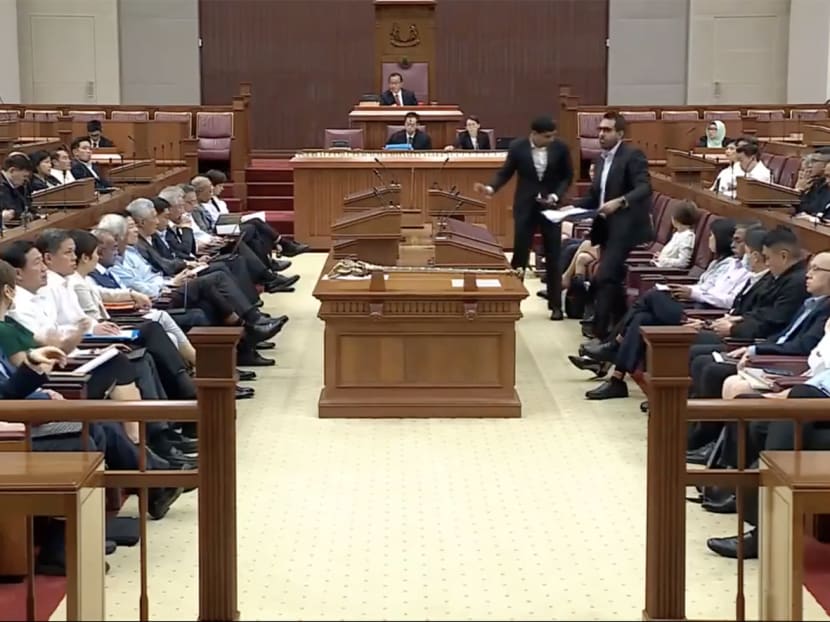Questions on ministers' code of conduct, perceived conflict of interest dominate debate on Ridout Road bungalows
SINGAPORE — Questions on the code of conduct for ministers and a perceived conflict of interest dominated the debate in Parliament on Monday (July 3) surrounding the rental of Ridout Road properties by Law and Home Affairs Minister K Shanmugam and Foreign Affairs Minister Vivian Balakrishnan.

A file photograph of Leader of the Opposition Pritam Singh addressing Parliament.
- Questions about the ministerial code of conduct and perceived conflict of interest dominated the debate in Parliament on Monday (July 3) surrounding the rental of Ridout Road properties
- Members of Parliament (MPs) also posed supplementary questions on issues such as whether it was appropriate for Senior Minister Teo Chee Hean to lead the independent review
- Mr Teo said that while the report found a “potential” conflict of interest, Law Minister K Shanmugam had identified this early and taken steps to prevent it from happening
- In addressing MPs' questions on perceived conflict of interest, Mr Shanmugam said that a government cannot run a country on such a subjective basis of perception
SINGAPORE — Questions on the code of conduct for ministers and a perceived conflict of interest dominated the debate in Parliament on Monday (July 3) surrounding the rental of Ridout Road properties by Law and Home Affairs Minister K Shanmugam and Foreign Affairs Minister Vivian Balakrishnan.
Over the six-hour debate, 19 Members of Parliament (MPs) also posed supplementary questions on issues such as whether it was appropriate for the independent review to be led by Senior Minister Teo Chee Hean.
These came on the heels of earlier ministerial statements delivered by Mr Teo, Second Minister for Law Edwin Tong, Dr Balakrishnan and Mr Shanmugam. Prime Minister Lee Hsien Loong also spoke on the matter.
MPs raised questions on the course of action undertaken by the ministers in renting the properties, and whether a conflict of interest was involved — although Leader of the Opposition Pritam Singh and other opposition MPs ultimately acknowledged that there was no corruption or wrongdoing.
‘NO BREACH’ OF CODE OF CONDUCT
MP Zhulkarnain Abdul Rahim from Chua Chu Kang Group Representation Constituency (GRC) asked Mr Teo to comment on the code of conduct for ministers, which speaks of both “apparent” and “perceived” conflicts of interest.
“A minister should not be in a position where his financial interests might be even conceivably (in) conflict with his public duty. So how should these standards be looked at in light of Minister Shanmugam’s case?”
Responding to this, Mr Teo said that a conflict of interest arises when a person’s duty or responsibility from the office he occupies conflicts with his own personal interests — and that a conflict of interest could be “actual” or “potential”, with the latter arising when a conflicted person is in a position to, but has yet to make, such a decision.
“In my report, I found that there was the potential for a conflict of interest to arise — a potential,” said Mr Teo.
“However, Minister Shanmugam identified this potential conflict of interest early beforehand and took steps to prevent it from actualising. He removed himself from the chain of command and recused himself from any decision making for the matter in question.
“Given the recusal and removal from duty, there can no longer be any potential conflict nor does a perception of conflict arise and, therefore, there is no breach of the code of conduct.”
Ms Sylvia Lim of the Workers’ Party (WP) cited the code of conduct, which states that ministers should not enter into transactions where financial interest might “conceivably” come into conflict with their public duties.
The Aljunied GRC MP then questioned if it had been “imprudent” for Mr Shanmugam to enter into the transaction with the Singapore Land Authority (SLA), as it was an agency under his charge.
Mr Teo reiterated his earlier response to Mr Zhulkarnain, adding that Mr Shanmugam had taken steps to remove himself from these duties and powers “over a matter which would have been a private matter”.
Mr Singh said that Singaporeans are not making the allegation that the ministers are corrupt.
“The issue I think we’re having to deal with here is the ministerial code of conduct and a specific course of action that was taken by the minister when he instructed his DS (deputy secretary) to get some information,” said the WP chief.
He was referring to Mr Shanmugam’s request through his ministry’s deputy secretary for a list of public properties to rent, instead of approaching the SLA directly.
Mr Singh said: “In my view, I think it is much more prudent in view of the ministerial code of conduct, which is onerous, to keep the matter separate — keep the official matter separate, keep your professional matter separate. There’s no need to ask a senior civil servant this information when you know you can get an agent to secure the same information.”
To this, Mr Teo said: “I’m very happy to hear Mr Pritam Singh say that nobody is alleging corruption. And so, my take is that this House actually concurs that there’s no wrongdoing. There's no corruption. There's no abuse of power.”
‘CAN’T RUN ANY GOVERNMENT’ ON THE BASIS OF A ‘PERCEIVED’ CONFLICT OF INTEREST
Associate Professor Jamus Lim, a WP Sengkang GRC MP, asked if, on hindsight, Mr Shanmugam and Dr Balakrishnan believed they had undertaken specific actions that could be “perceived” as a conflict of interest — keeping in mind that they operate as public servants and that perceptions are “very important” for public figures.
Responding to this, Mr Shanmugam said: “I think it's an important question and it’s at the heart of a lot of misunderstanding, even from lawyers.
He added that it seemed from questions from Assoc Prof Lim and others, perceived conflict is “if others perceive you to be in conflict, you are in conflict, and therefore you're in breach of the ministerial code”.
“It doesn't matter that you recuse yourself. It doesn't matter that the matter was decided perfectly properly,” said the minister.
“Now, you can't run any government on that basis.”
Mr Shanmugam then cited hypothetical examples of other perceived conflicts, such as when the Minister for Health goes to a public hospital for a knee replacement operation.
Even though everything is done properly, someone can argue that there is perceived conflict as the minister plays a role in appointing the hospital’s chief executive and the hospital might treat the minister better than it treats others.
“Can a government work on this basis? That it is entirely up to a subjective viewpoint on perception?” he asked.
“Stripped of the legalese, in essence, what is being said is if you are in charge of a ministry you must not engage in any transaction which is available to public citizens,” he added.
“If that is so, that is a new principle. But that's not the principle in the code.”
He said that the ministerial code of conduct must be followed “sensibly and properly” both in letter and spirit and not lead to “absurd results”.
‘APPROPRIATENESS’ OF SM TEO LEADING REVIEW
Several MPs, including MP for Potong Pasir Single Member Constituency (SMC) Sitoh Yih Pin, also raised questions on whether it was “appropriate” for Mr Teo to lead the independent review.
Mr Teo said that there was no conflict of interest involved in him conducting the review.
He is not involved in the rental transactions of the two properties nor has he taken any actions or decisions regarding the rental of these two properties, he added.
“So, I'm not an involved party. I'm not a subject of the CPIB investigation, nor the subject of this review either.”
WP MP Leon Perera (Aljunied GRC) also asked why the review had not been tasked to an independent entity or third party, such as the Auditor-General's Office or an independent judge.
“I’m not asserting that SM Teo’s review is not independent. But I think the perception that that judgement, that determination was being made by someone who is not a senior colleague of the ministers concerned, but is an independent entity, would go some way to address some of these public concerns,” he said.
In response, Mr Teo said that the Auditor-General looks at things dealing with audits, such as the misappropriation or loss of funds.
“The CPIB is the agency which investigates such matters, and we know the reputation of the CPIB — it is a very thorough, very independent agency.”
Mr Teo added that the fact that the Prime Minister had tasked the CPIB to carry out the investigation on two senior ministers showed the seriousness with which the Government and the Prime Minister took the issue.
ON REVISING FRAMEWORK FOR ‘POLITICALLY EXPOSED PERSONS’
Dr Tan Wu Meng (Jurong GRC) asked whether the public service should consider a framework whereby the personal transactions of “politically exposed persons with government agencies” are automatically flagged for additional scrutiny.
In response, Mr Teo said that there are already processes in place for public officers to declare any conflict of interest upfront, especially for transactions involving public tenders.
Beyond this, the public service also has an internal disclosure policy requiring public officers to report any wrongful practice to the head of their agency.
Nevertheless, Mr Teo said that such checks at the agency level are only part of the system and do not address the “fundamental issue at hand” — adding that the onus still rests on the individual to declare and recuse himself to prevent a conflict of interest from arising.
Acknowledging Mr Shanmugam’s association with the SLA, Mr Teo said “that will always be there; you can’t remove that.
“But that will mean that the Prime Minister, for example, cannot do anything because he has powers over practically every agency in Singapore.
“So I think one has to look at the realities of the situation and what steps people have taken, and, most importantly, to have confidence in the integrity of the public service and our public officers.”
Mr Leong Mun Wai, the Secretary-General of the Progress Singapore Party (PSP), asked whether it would be the expectation that ministers should not touch anything that they were doubtful of, and whether the ministers had “considered the possibility of negative public perception” in their rental of the “relatively cheaper” public bungalows.
Addressing this, Mr Teo said that the idea of the bungalows being leased at a “relatively cheap rate” was a “misconception” which should be completely dispelled.
He said that the bungalows are rented out at market rates, adding that 83 per cent of the bungalows are managed by managing agents, while 17 per cent are managed by the SLA.
Mr Teo added that valuations were carried out by the valuation department in the SLA, which is distinct and separate from its leasing department, and the bungalows were also valued by the managing agents.
RIDOUT RENTAL BENCHMARKED AGAINST PRIVATE RESIDENTIAL MARKET
In his ministerial statement prior to the debate, Mr Tong clarified that the valuation of the black-and-white properties for rental was dependent on various factors, with the unit’s gross floor area being the “guiding component” in determining its rent. Other relevant factors, such as its condition and location, were also considered.
During the debate, WP MP Louis Chua questioned the renewal of the lease on 31 Ridout Road, which was rented to Dr Balakrishnan.
The Sengkang GRC MP noted that the lease was renewed in October last year, at an increased rental rate of S$20,000, up from S$19,000 — about a 5 per cent increase in rent.
Mr Chua also cited data from the Urban Redevelopment Authority that showed how landed properties in the same time period had seen an increase in market rental rate by about 35 per cent.
Responding to this, Mr Tong said that 31 Ridout Road was managed by external professional managing agents, who independently assessed an appropriate rental rate upon the lease’s renewal.
“There’s also a question of these (properties) fundamentally being older, not possessing the usual amenities and facilities that you might expect to see in a good class bungalow or a bungalow of this comparable size. So I think that accounts for the difference in the market,” he said.
He added that the “Covid overhang over the market at that point in time” must also be considered.













